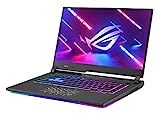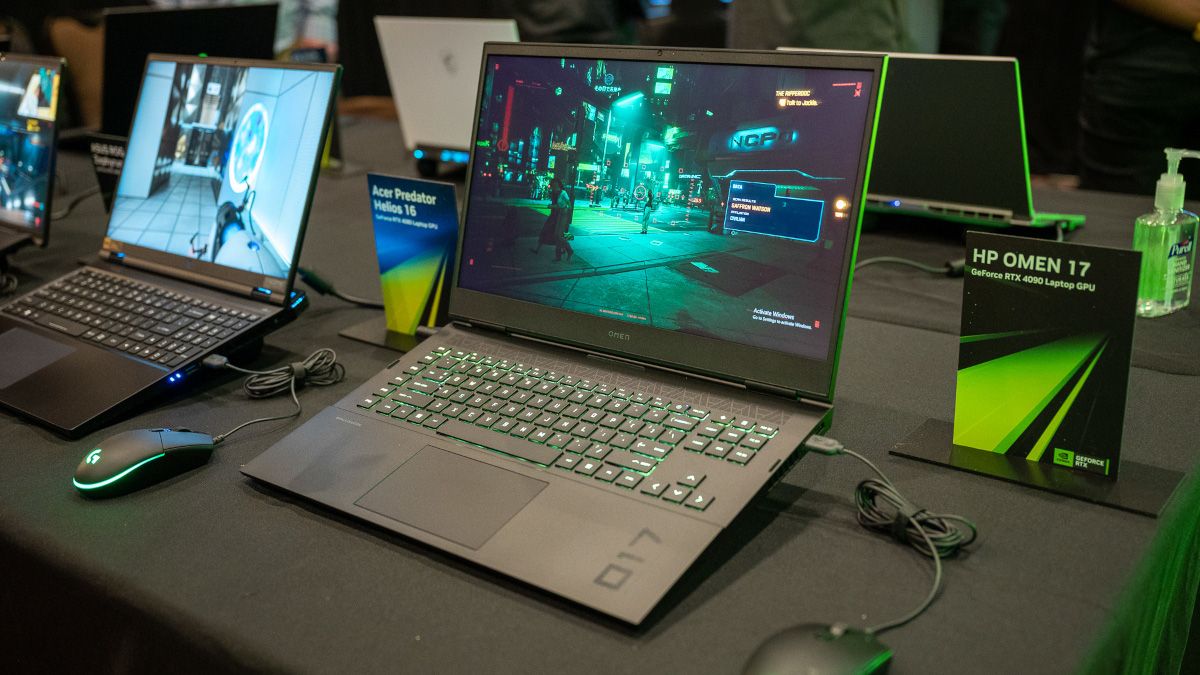Quick Links
Key Takeaways
If you value portability, you should buy a gaming laptop considering how much they've improved in recent years. If you don't mind being stuck at a desk, though, buying a gaming desktop is still a better investment in terms of upgradability and performance per dollar.
In PC gaming, you have a choice between a gaming desktop or a laptop. However, it's not always clear which one of these options is the right one for you. Before you buy, get to know the key differentiators.
Performance
When it comes to gaming, performance is critical. You want a system that can handle even the most demanding games and applications without lag or slowdowns. So, when deciding between a gaming laptop and desktop, it's essential to consider the performance differences.
Gaming laptops are designed to be portable and energy-efficient, so they usually use mobile versions of CPUs and GPUs. While these components are still powerful, they may not match their desktop counterparts' processing power and graphics capabilities. As a result, gaming laptops can't run some games at the highest settings or achieve the same frame rates as the best desktop systems.
That being said, modern gaming laptops have come a long way in recent years and can still deliver a great gaming experience. In practice, the actual sacrifices in games are relatively minor, and most mid-range gaming laptops today are as fast as the typical desktops PC gamers actually use, rather than the niche high-end rigs so few people actually have.
Apart from offering the highest performance components in absolute terms, desktop gaming PCs' main advantage is performance per dollar. The desktop equivalent of a given gaming laptop will usually cost significantly less. So although you'll get the same gaming experience with both performance-matched systems, you'll be paying a premium for the laptop form factor and mobility.
However that price gap has been shrinking steadily, and you may find that the space-saving, portability, and power consumption perks of a gaming laptop may actually make the few hundred dollar premium versus an equivalent desktop more attractive than you might think.
Price and Value
That leads us neatly into the discussion of the price and value of gaming laptops and PCs. Price is simple enough to discuss, but value is highly subjective. What's valuable to one person isn't worth much to the next. So a PC gamer who only ever games at their desk, doesn't care about how large their PC is, has no concern for power bills, or isn't interested in the unique advantages of gaming laptops will find little of value.
Let's look at a practical example, with the 2022 ASUS ROG Strix G15 equipped with an AMD Ryzen 7 6800H and a RTX 3060 laptop GPU. Apart from the somewhat limiting 6GB of VRAM, this is a computer that's roughly in the same performance bracket as current-generation consoles if you look at raw GPU compute, before taking its additional ray tracing performance and access to DLSS technology into account. It's not a perfect comparison, but you're playing in the same league here.
A current-generation console costs $500, which means the price difference is around $700 to get a similar gaming experience, but with the various perks of PC gaming. A decent non-gaming laptop is going to come in at around $500 to $700 as well, and you don't have to buy a monitor or TV if you don't want to. This is just one example of how the value of a gaming laptop can be good, depending on your needs and how you look at it.

ASUS ROG Strix G15 (2022) Gaming Laptop
Priced to move and with enough punch to play modern titles at high settings and frame rates at 1080p and 1440p.
While the price-to-performance advantage of a desktop gaming PC can't be disputed, what about its value? While a laptop offers you freedom of movement, desktop PCs offer other types of freedom. The freedom to build according to your budget, to incrementally upgrade, to buy used components, to choose the exact design and style of your system, to customize it for different tasks and game types---the list goes on and on!
Flexibility and Upgradability
It seems that desktop PCs win hands-down regarding flexibility and upgradability. If we're talking about the flexibility to build a computer that matches your needs and tastes exactly, that's true.
However, gaming laptops offer a different kind of flexibility. The flexibility to take PC gaming everywhere while still maintaining the other uses of non-gaming laptops. You have the flexibility to play anywhere in your own home, not just your desk. You can dock to your gaming monitor one moment and hook up your laptop to the TV next.
In terms of upgradability desktops really are in another league, however. Laptops are generally limited to upgrading RAM and storage. Even external GPUs are generally not worth connecting to gaming laptops in particular, since the internal dedicated GPUs tend to offer much better performance per dollar.
That being said, desktop PCs can sometimes create an upgrade paradox, where upgrading one component, such as the GPU, causes an imbalance in the system leading to a need to a new CPU, which leads to a new motherboard, which might need new RAM, and so on.
Add to this that the short upgrade cycle so many people think goes with PC gaming is neither necessary nor typical, and the upgradability of desktop PCs doesn't quite add up to the trump card it sounds like. Buy a decent gaming laptop and then replacing it every 3-5 years might not be more expensive than essentially rebuilding your entire PC in pieces over the same time period.
Portability
This is another category you may think is easy to hand over to laptops, but don't underestimate how portable desktop computers can be. These days there are many options for building Small Form Factor desktop PCs that are highly portable. They aren't mobile in the sense that they're all-in-one systems that can run from battery power anywhere, but you can definitely put something together that's easy to take with you and set up in a hotel room or at your parent's house when you visit.
These SFF computers can have truly high-end parts, can be cooled with the latest methods such as water cooling or vapor chamber coolers, and will give you more performance for your buck compared to a gaming laptop.
Gaming laptops win in the mobility category easily, however, and there are some jaw-dropping thin and light gaming laptops that easily keep up with upper mid-range desktop PCs. Think in terms of desktop core i5 or i7 systems equipped with something between a desktop RTX 3060 Ti and a 3070 and you'll have a fair idea of how capable those machines are. All packed into something that weighs less than five pounds and can fit in a typical messenger bag.
Should I Buy a Gaming Desktop or Laptop?
As you can tell, it's no longer a straightforward decision when it comes to gaming desktops vs. laptops. Thanks to technological improvements, various market factors affecting desktop component prices, and changes to how many gamers like to engage with the hobby, much of the accepted wisdom around gaming laptops no longer apply.
That being said, if you do not need the specific and unique advantages gaming laptops have in terms of mobility, versatility, power consumption, and space-saving, you shouldn't buy one. If you only ever play PC games at your desk or any other permanent spot, a gaming laptop makes no sense.
In that case, it's safer to stick to desktop PC gaming. Especially (and somewhat paradoxically) if you're on a tight budget or you care about having the absolute best gaming performance that money can buy. PCs serve both ends of that spectrum incredibly well.
It's in that mid-range $1000 to $2000 segment where things really get fuzzy. Gaming laptops in this price bracket have the performance of powerful mid-range modern gaming PCs, but all the perks of a work laptop or to an extent professional workstation laptops for content creators and other power users. If you fall into that sweet spot, you should seriously consider a gaming laptop as one device that does it all for you.

